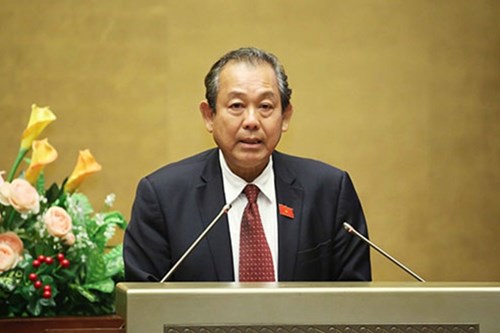Binh made the statement while delivering a report on supplementary assessment of socio-economic development results in 2017 and the first months of 2018 as well as key tasks and solutions for the coming times at the 14th-tenure National Assembly’s fifth session, which kicked off in Hanoi on May 21.
    |
 |
|
Deputy Prime Minister Truong Hoa Binh reports on the socio-economic development of the country in front of the National Assembly. Photo: enternews.vn |
He said that the Government’s management work will follow the orientations of building on achievements gained from the beginning of this tenure, especially in 2017 and the first months of 2018, pressing ahead with the drastic and synchronous implementation of tasks and measures set in the Party, National Assembly and Government’s resolutions, and avoiding subjectivity in steering and administration.
The Government will keep a close watch on the domestic and international situations in order to make suitable and timely reactions, while paying attention to addressing newly emerging issues, tackling existing shortcomings and weaknesses, and making efforts to fulfill all targets set for 2018 in order to facilitate sustainable development in the following years, thus contributing to the successful implementation of the five-year plan from 2016-2020.
To stabilize the macro-economy, control inflation and boost economic growth, the official emphasized that the Government will maintain the effective and synchronous implementation of monetary and financial policies.
Efforts will be exerted to control the average consumer price index increase of around 4 percent, achieve a gross domestic product (GDP) growth of over 6.7 percent, and reduce interest rates, especially in priority fields, he stated.
He also stressed the importance of stabilizing the foreign currency market, raising the State’s foreign exchange reserves, controlling the credit scale at a reasonable level, and strictly monitoring highly risky fields.
Predicting both opportunities and challenges for Vietnam brought by the regional and world situation, the Deputy PM said that the Comprehensive and Progressive Agreement for Trans-Pacific Partnership (CPTPP) will generate positive effects, while many international organizations forecast the Vietnamese economy will continue growing well.
However, he noted that the country’s labor productivity and competitiveness remain low, with a lack of high-quality human resources. Production technologies and administration capacity in many sectors and enterprises are out-of-date, and State management efficiency is still low.
Demands for investment in infrastructure, social welfare, environmental protection, climate change response, and defense and security remain huge, while the domestic resources are limited, Binh stated, adding that natural disasters are forecast to develop complicatedly, affecting production and lives of people.
Comparing the final outcomes of socio-economic development in 2017 with preliminary results mentioned in a Government report in the legislature’s fourth session, Binh said that seven out of 13 criteria saw improvement. Notably, GDP growth rate reached 6.81 percent compared with 6.7 percent as reported earlier, while export turnover rose by 21.2 percent in comparison with the estimated 14.4 percent.
In the first months of 2018, the marco-economy maintained stable, core inflation was curbed at 1.34 percent, and CPI increased by 2.8 percent during January-April.
Monetary policy was managed flexibly, the foreign exchange market and foreign exchange rate were stable, and the State’s foreign exchange reserves were USD 63.5 billion.
GDP growth rate hit 7.38 percent in the first quarter of 2018 – the highest rate in the past 10 years, with expansion seen across agriculture, industry and construction, and services.
The Purchasing Managers' Index (PMI) was 52.7 points, and listed in the leading group in the Association of Southeast Asian Nations (ASEAN), said Binh.
Source: VNA